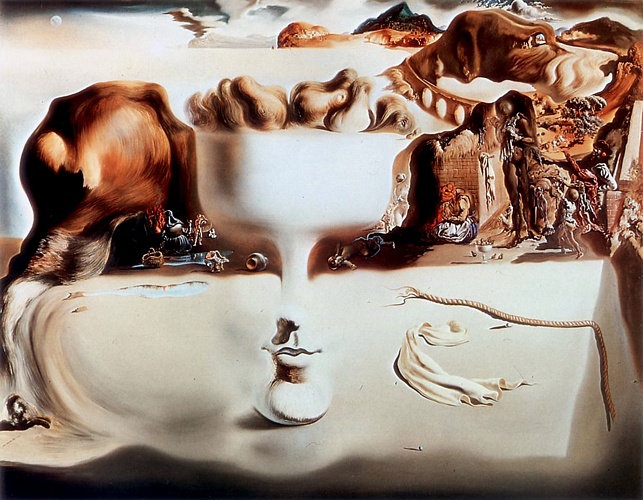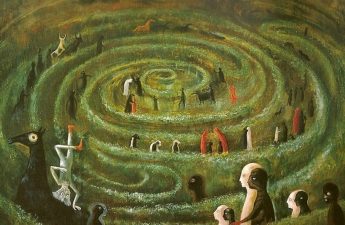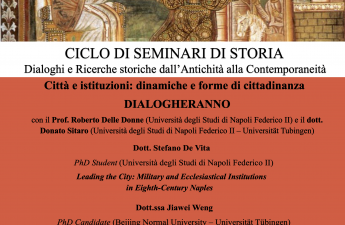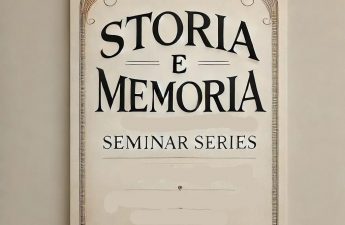Call for Papers
I INTERNATIONAL PhD STUDENTS AND RESEARCHERS CONFERENCE
Traces of Identity: Expressions, Manipulations, and Persistences from Antiquity to the Contemporary Age
(26-27 FEBBRAIO 2024, Sala Lignea, ExCataloghi, di via Porta di Massa, 1, Napoli)
People possess multiple identities because they occupy multiple roles,
are members of multiple groups and social categories, and claim multiple
personal characteristics, yet the meanings of these identities are shared with
and understood by members of society.
(Burke P.J., Stets J.E., Identity Theory, Oxford University Press, Oxford 2022)
The Department of Studi Umanistici dell’Università degli Studi di Napoli Federico II, with the Ph.D programs in “Scienze storiche, archeologiche e storico-artistiche”, in “Historical Studies”, and in “Archaeology and Art History”, promotes the I International Ph.D. Students and Researchers Conference, titled Traces of Identity: Expressions, Manipulations, and Persistences from Antiquity to the Contemporary Age. The Conference will focus on the different methodologies and approaches concerning the “traces” of identity, which investigate various fields related to History, Archaeology, and Art History across different times (Antiquity, Medieval, Modern, and Contemporary Ages). The aim is to create a space for exchange, comparison, and discussion in the spirit of interdisciplinarity, which will hopefully lead to new perspectives.
Identity as a concept weaves numerous historical dynamics, shaping traditions, institutions, memory, material culture, and expressions of Arts. Identity is strictly linked to the appearance and recurrence of shared practices concerning social, political, and cultural phenomena, which in turn contribute to the creation, modification, or replacement of other identities. Its shifting character can be traced in the accounts and myths about ethnic groups, elaborations of Arts, and specific archaeological contexts. As an operative concept, identity — whether social, geographical, or political — becomes a suitable tool for elaborating forms of representation and self-representation in the various fields of cultural production and communication, leaving traces in every human activity.
Considering all these aspects, identity will be seen as a filter through which multiple kinds of research can contribute to the current scientific debate.
Consequently, the Conference aims to explore the different traces which allow us to grasp the processes of claiming and building identities from the Antiquity to the Contemporary Age, as well as their related expressions, manipulations, and persistences. Further down are some areas of interest that may be included:
- Identity Monumentalization;
- Identity in historiographical debate;
- Identity and Memory;
- Identity-related memories and traditions among in urban and non-urban contexts;
- Political instrumentalizations of Identity;
- National Identity and Ethnogenesis;
- Identity in Material culture;
- Identity and Migrations;
- Identity and Religion;
- Identity, geographical and geopolitical boundaries;
- Myths and elaborations of Identity;
- Authenticity and falsification of Identity;
- Self-representation and appropriation of Identity;
- Reuse, contamination, and refunctionalization of Identity;
- Historical, Arts, and archaeological witnesses related to Identity.
This Call for Papers is addressed to all Ph.D. students who deal with Historical, Archaeological, and Art Historical disciplines, as well as all researchers in the same fields who graduated no more than 5 years ago. To participate, it is required:
- Submission of an abstract in PDF format (max. 250 words, excluding bibliography), written in one of the main European languages. The abstract must include a title and 5 Keywords;
- A brief curriculum studiorum (max. 150 words), indicating the Academic Institution, the Academic discipline, and Academic qualifications.
The deadline for submitting applications is set for November 30, 2023. Contributions must be sent via email to the following address: convegnotracce2024@gmail.com.
Bibliographical references
Aime, M., Papotti, D., L’altro e l’altrove, Einaudi, Torino 2012.
Burke, J., Art and identity in Early Modern Rome, Routledge, London, 2008.
Citroni M., Wiseman T.P., Carandini A., Memoria e Identità. La cultura romana costruisce la sua immagine, SAMERL, Firenze 2003.
Diefendorf B.B., Hesse C. (eds.), Culture and identity in early modern Europe (1500-1800), The University of Michigan Press, Ann Arbor 1993.
Fabietti, U., L’identità etnica. Storia e critica di un concetto equivoco, Carocci, Roma 1995.
Ferraris, A.O., La costruzione dell’identità, Bollati Boringhieri, Torino 2022.
Gnoli, T., Neri, V., Le identità regionali nell’Impero tardoantico, Jouvence, Milano 2019.
Gombrich, E.H., The uses of images: studies in the social function of art and visual communication, Phaidon, New York 1999.
Graves-Brown, P., Jones, S., Gamble, C. (eds.), Cultural identity and archaeology: the construction of European identity, Routledge, London 1996.
Hall, J., The Self-Portrait: A Cultural History, Thames & Hudson, London 2016.
Hall, J.M., Ethnic identity in Greek antiquity, Cambridge University Press, Cambridge 1997.
Kaldellis, A., Romanland: Ethnicity and Empire in Byzantium, The Belknap Press of Harvard University, Cambridge-London 2019.
Pohl, W., Le origini etniche dell’Europa. Barbari e Romani tra antichità e medioevo, Viella, Roma 2000.
Rossi Pinelli, O., Arte di frontiera. Pittura e identità nazionale nell’Ottocento nord-americano, Carocci, Roma 2002.
Organizing Committee: Broli Costanza, Caruso Gabriele, Chiari Gianmarco, Consolo Giuseppe, Di Benedetto Paolo, Guarente Marina, Santagata Paolo, Puca Simona



